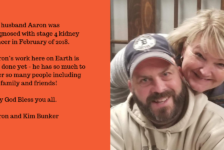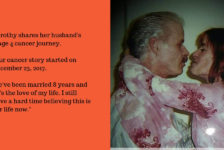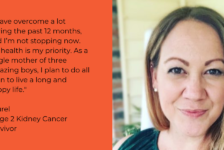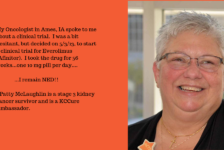In the making a difference series, KCCure’s Director of Patient Engagement, Laura Loughlin, will be highlighting organizations making a difference in Kidney Cancer research. In this article we are profiling the work being done at The Rare Cancer Research Foundation (RCRF), with focus on their patient directed consent platform Pattern.org.
The Rare Cancer Research Foundation (RCRF) is a 501(c)3 nonprofit organization, committed to helping advance research to find cures for rare and under-represented cancers, including rare Kidney Cancers. This is a critical need as collectively rare cancers are the leading cause for cancer death in the US. The RCRF recognized that to advance research in this area a vehicle that allows patients to authorize tissue donation and collaborate with researchers is of high value.

Barbara Van Hare
KCCure had the opportunity to work with Barbara Van Hare, Director of Foundation Partnerships, to understand how the RCRF is meeting this need and making a difference in Kidney Cancer research.
Pattern.org
Pattern.org is an online tool launched by the RCRF that allows patients to consent to donate medical data and excess tumor tissue from their surgery to top researchers. This video walks you through the process to provide consent for tissue donation using Pattern.org. You will want to have contact information on hand for your surgeon, oncologist and the facility where your procedure will be completed when ready to consent.
The type of cancer does need to be known prior to using Pattern.org to give consent. Specific to kidney cancer this can be difficult as most kidney cancer patients don’t have biopsies prior to surgery. However, if you have recently been diagnosed with a rare kidney cancer via biopsy and you’re scheduled for surgery, donating your tissue is an option. Patients who have already had their primary tumor removed can also consider donating tissue from later surgeries to remove metastatic disease. Tissue donated can be identified as either Chromophobe, Translocation, Papillary or other rare Kidney Cancers.
As part of the consent process, Pattern.org will link your tissue donation to a specific research project. You will be provided information on the project and the option to complete your consent if you decide to move forward. Providing consent to donate tissue takes approximately 10 minutes with the Pattern.org system. After your consent is entered, the RCRF takes care of all the logistics of donation and there is no cost to you. 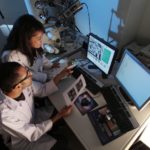
Care is taken at the time of donation to ensure that enough tissue remains for use in your treatment. Your current treatment will not be impacted if you choose to donate. While you will not receive any information on the specific research done with your tumor tissue, each donation makes a valuable contribution to efforts underway to find cures. If you decide to donate tissue, the best approach is to complete your consent in Pattern.org at least one week prior to your procedure. Donation through Pattern.org is currently only supported within the continental United 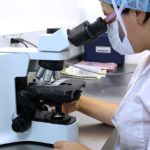 States.
States.
Benefits to Donation
The immediate benefit of donating tissue to research is that researchers can use the tissue to create copies of your cancer cells, called models, that can be grown in a lab and used in ongoing research. Long term, after researchers have refined an understanding of a rare or under-represented cancer, these models will play an important role in customization of treatments for individual patients based on their genetic makeup. Models can be shared among researchers, allowing for collaboration that can accelerate finding cures.
KCCure proudly supports the use of Pattern.org. If you meet the criteria to donate tissue, please consider registering. Ten minutes of your time can make a significant difference in Kidney Cancer research. KCCure wishes to thank Barbara van Hare for the information shared on Pattern.org, and the ongoing work done at the RCRF to support efforts to find cures for rare and under-represented cancers.

